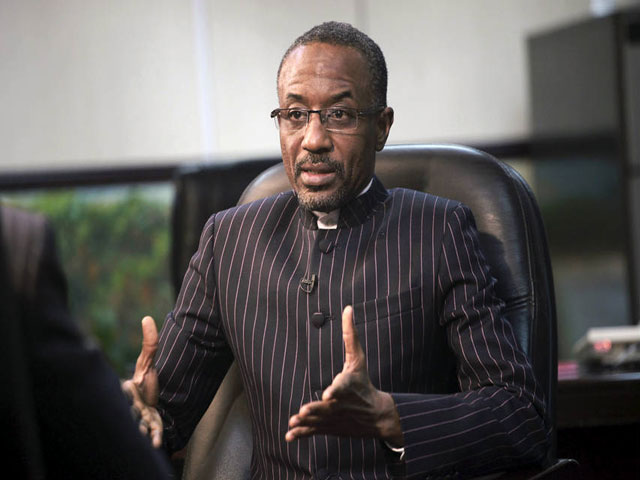The Governor of the Central Bank of Nigeria (CBN), Mallam Sanusi Lamido Sanusi, yesterday explained that the increased government spending on the ongoing military action in the North-east to curtail insurgency could further spike inflationary pressures as well as dampen the exchange rate in the economy.
The central bank for the 10th consecutive time also resolved to leave the Monetary Policy Rate (MPR), otherwise known as interest rate, at 12 percent with a corridor of +/-200 basis points around the MPR.
The MPR is the rate at which the CBN lends to commercial banks and greatly determined the cost of borrowing to the real sector.
The bank also retained banks’ Cash Reserve Requirement (CRR) at 12 percent and Liquidity Ratio at 30 percent as well as the Net Open Position at 1.0 percent.
However, Sanusi said although Coordinating Minister for the Economy and Minister of Finance, Dr. Ngozi Okonjo-Iweala, had announced that there would be no supplementary budget to fund the declaration of state of emergency, her confirmation that there would be a draw-down on contingency vote, which is already embedded in the 2013 budget, called for a serious concern.
Addressing journalists in Abuja after the two-day Monetary Policy Committee (MPC) meeting, Sanusi, who read the committee’s communiqué, called for prudence in monetary policy action.
He said there was evidence of an increase in the rate of government expenditure this year when compared to 2012, adding that the CBN could be forced to consider more restrictive policy stance, if necessary.
“However, the committee noted with caution the high GDP growth projection in view of the extant risk factors such as widespread insecurity, weak infrastructure and probable flooding from the projected heavy rains in some parts of the country.
“In addition, the state of emergency in the North-east and the accompanying military operations in that axis have the potential to adversely affect economic activities generally, including agricultural production and food prices, as well as consumer demand,” he said.
However, in arriving at the resolve to leave the interest unchanged, Sanusi said seven MPC members voted in favour of retaining the rate at 12 percent while three other voted for a reduction by 50 basis points.
The CBN governor, who maintained that the coast was not yet clear for easing of monetary policy, said the committee had considered a reduction in rates in view of declining core inflation, stable exchange rates, relative reserve accretion against the backdrop of sustained pressure to ease the stance of monetary policy.
The committee also pondered over the retention of current policy stance to sustain the macro-economic gains of tight monetary policy and to continue to rein in inflationary expectations.
“The committee considered and acknowledged the merits of option one but rejected it as being premature in view of the potential risk factors in the horizon posed by recent developments, which would necessitate increased fiscal expenditure in the short to medium term, resulting in a resurgence of inflationary pressure.
“The committee conceded and decided by a majority of 7 votes to 3 to hold policy with three members voting to reduce MPR by 50 basis points.
“Personally, I don’t agree that we should change rates for the sake of changing rates; I think we would change rates if we think we need to respond to the situation.
“The government would spend money and we would keep monetary policy tight. If the spending gets excessive, we would respond appropriately. So if there’s any risk from the fiscal side, it’s that we may have to tighten policy further if this warrants it.
“I don’t think at this point in time, a reduction in rates is imminent. I want to say that holding policy is not neutral and the example I give is that this is where we’ve always wanted to be. We’ve wanted to have inflation under 10 percent; we’ve wanted to have exchange rate stability; we wanted to have a recovery in the capital market and we’ve wanted to build up reserves.
“Now, through a combination of tight monetary policy and some improvement in the fiscal discipline, we have come here. So why do you want to change it?
“We are not looking for high inflation and we are not looking for a drain on our reserves. These decisions are taken on a balance of arguments,” he further stated.
Moreover, Sanusi noted that in spite of increased borrowings, yields on Federal Government of Nigeria bonds had been moderating steadily thereby signalling the impact of increased inflows while equity price had been trending upwards. He said, “the evidence doesn’t therefore support claims of monetary policy being too tight.”
Meanwhile, Sanusi also yesterday revealed new measures being adopted to refinance and restructure the Asset Management Corporation of Nigeria (AMCON) to ensure that the CBN remains its sole creditor by 2014.
The move, according to him, will create a situation where AMCON’s obligations are gradually being extinguished.
He said: “Today, AMCON has debt outstanding with a face value of about N5.7 trillion and basically these are zero-coupon bonds which mean the principle amount is about N3.9 trillion. NowN3.6 trillion of these bonds are held by the central bank. And therefore, about N2.1 trillion held by banks other than the CBN-private sector banks.”

